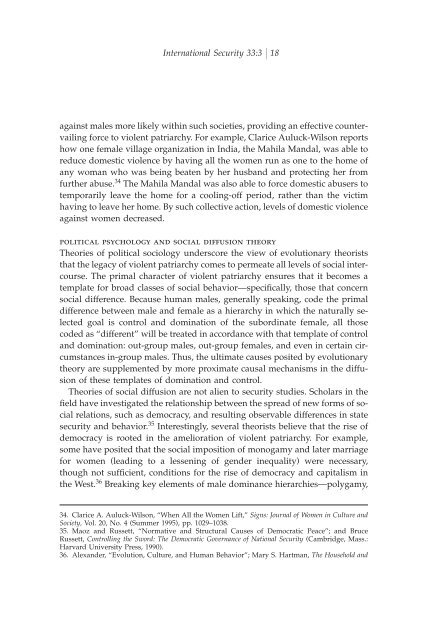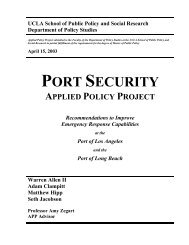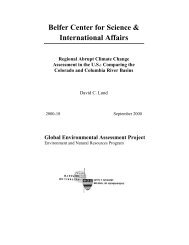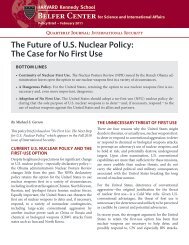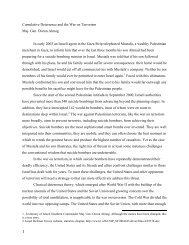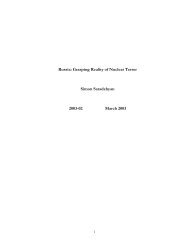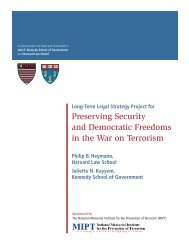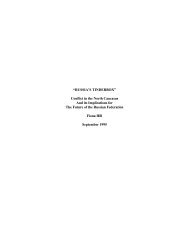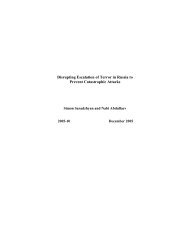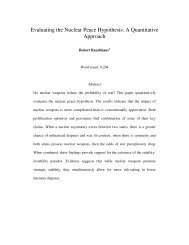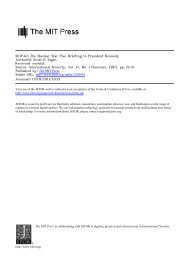The Heart of the Matter Valerie M. Hudson, - MIT Press Journals
The Heart of the Matter Valerie M. Hudson, - MIT Press Journals
The Heart of the Matter Valerie M. Hudson, - MIT Press Journals
Create successful ePaper yourself
Turn your PDF publications into a flip-book with our unique Google optimized e-Paper software.
International Security 33:3 18<br />
against males more likely within such societies, providing an effective countervailing<br />
force to violent patriarchy. For example, Clarice Auluck-Wilson reports<br />
how one female village organization in India, <strong>the</strong> Mahila Mandal, was able to<br />
reduce domestic violence by having all <strong>the</strong> women run as one to <strong>the</strong> home <strong>of</strong><br />
any woman who was being beaten by her husband and protecting her from<br />
fur<strong>the</strong>r abuse. 34 <strong>The</strong> Mahila Mandal was also able to force domestic abusers to<br />
temporarily leave <strong>the</strong> home for a cooling-<strong>of</strong>f period, ra<strong>the</strong>r than <strong>the</strong> victim<br />
having to leave her home. By such collective action, levels <strong>of</strong> domestic violence<br />
against women decreased.<br />
political psychology and social diffusion <strong>the</strong>ory<br />
<strong>The</strong>ories <strong>of</strong> political sociology underscore <strong>the</strong> view <strong>of</strong> evolutionary <strong>the</strong>orists<br />
that <strong>the</strong> legacy <strong>of</strong> violent patriarchy comes to permeate all levels <strong>of</strong> social intercourse.<br />
<strong>The</strong> primal character <strong>of</strong> violent patriarchy ensures that it becomes a<br />
template for broad classes <strong>of</strong> social behavior—speciªcally, those that concern<br />
social difference. Because human males, generally speaking, code <strong>the</strong> primal<br />
difference between male and female as a hierarchy in which <strong>the</strong> naturally selected<br />
goal is control and domination <strong>of</strong> <strong>the</strong> subordinate female, all those<br />
coded as “different” will be treated in accordance with that template <strong>of</strong> control<br />
and domination: out-group males, out-group females, and even in certain circumstances<br />
in-group males. Thus, <strong>the</strong> ultimate causes posited by evolutionary<br />
<strong>the</strong>ory are supplemented by more proximate causal mechanisms in <strong>the</strong> diffusion<br />
<strong>of</strong> <strong>the</strong>se templates <strong>of</strong> domination and control.<br />
<strong>The</strong>ories <strong>of</strong> social diffusion are not alien to security studies. Scholars in <strong>the</strong><br />
ªeld have investigated <strong>the</strong> relationship between <strong>the</strong> spread <strong>of</strong> new forms <strong>of</strong> social<br />
relations, such as democracy, and resulting observable differences in state<br />
security and behavior. 35 Interestingly, several <strong>the</strong>orists believe that <strong>the</strong> rise <strong>of</strong><br />
democracy is rooted in <strong>the</strong> amelioration <strong>of</strong> violent patriarchy. For example,<br />
some have posited that <strong>the</strong> social imposition <strong>of</strong> monogamy and later marriage<br />
for women (leading to a lessening <strong>of</strong> gender inequality) were necessary,<br />
though not sufªcient, conditions for <strong>the</strong> rise <strong>of</strong> democracy and capitalism in<br />
<strong>the</strong> West. 36 Breaking key elements <strong>of</strong> male dominance hierarchies—polygamy,<br />
34. Clarice A. Auluck-Wilson, “When All <strong>the</strong> Women Lift,” Signs: Journal <strong>of</strong> Women in Culture and<br />
Society, Vol. 20, No. 4 (Summer 1995), pp. 1029–1038.<br />
35. Maoz and Russett, “Normative and Structural Causes <strong>of</strong> Democratic Peace”; and Bruce<br />
Russett, Controlling <strong>the</strong> Sword: <strong>The</strong> Democratic Governance <strong>of</strong> National Security (Cambridge, Mass.:<br />
Harvard University <strong>Press</strong>, 1990).<br />
36. Alexander, “Evolution, Culture, and Human Behavior”; Mary S. Hartman, <strong>The</strong> Household and


